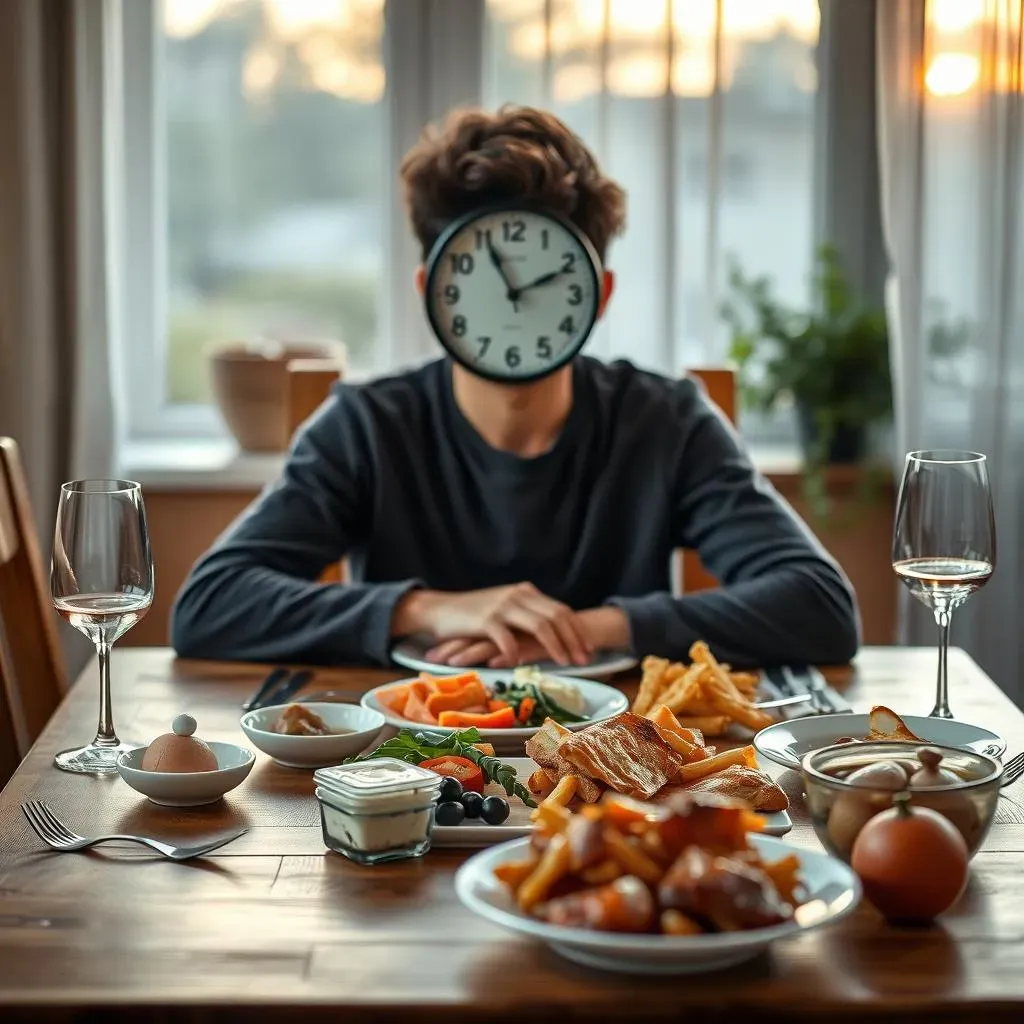Table of Contents
Ever find yourself staring at the clock, wondering, "What is healthy dinner time, anyway?" It's a question many of us ponder, especially when juggling busy schedules and late-night cravings. We've all heard the whispers about how late-night meals can wreak havoc on our waistlines, but is there an actual "perfect" time to eat dinner? This article isn't about rigid rules, but rather about understanding how your body's natural rhythms and digestion play a role in your health. We'll explore the connection between when you eat and how it affects your weight, your sleep, and even your digestion, and we'll cover how to make mindful choices so you can enjoy your evening meals without the guilt. We'll also dig into practical tips for making better choices about both your meal timing and what you put on your plate. So, let's get started on figuring out what's the best dinner time for you.
Is There a "Best" Time for Dinner?

Is There a "Best" Time for Dinner?
The Clock and Your Chow
So, you're wondering if there's a magic hour for dinner, huh? Well, the truth is, it's not as simple as setting your watch to 6 PM and calling it a day. Our bodies are complex, and what works for one person might not work for another. But, there's a growing idea that eating before the sun dips below the horizon might be beneficial. Think about it, our ancestors didn't have electric lights and late-night snacks, and their bodies seemed to manage just fine. The main thing is to be aware of when your body needs to eat and not just eating out of boredom.
The idea of a "best" time is more about aligning your eating schedule with your body's natural rhythms. This is often referred to as your circadian rhythm, which is basically your body's internal clock. This clock regulates all sorts of things, including when you feel hungry and when you're ready to sleep. Eating too late can throw this clock off, potentially leading to some not-so-fun side effects like weight gain and poor sleep. It's not a hard rule, but it's something to think about.
Circadian Rhythms: Your Body's Internal Clock
Imagine your body is like a little city that runs on a schedule. The circadian rhythm is the city's manager, making sure everything happens when it should. When you eat at the "wrong" time, it's like throwing a wrench into the city's gears. Your metabolism, which helps you break down food, isn't as efficient at night and this may lead to weight gain. But, if you eat at the right time, your city runs smoothly and you can enjoy dinner without worry. It's about finding your body's natural groove.
It's not just about weight either, eating too close to bedtime can also cause some digestive discomfort. Think of it like this, if you eat a big meal and then lay down, your stomach is now trying to digest everything in a horizontal position. This can lead to things like acid reflux, which is not fun. So, timing your dinner to give your body some time to digest before bed can really help prevent those late-night tummy troubles.
Factor | Impact of Late Dinner | Impact of Earlier Dinner |
|---|---|---|
Weight Management | Increased risk of weight gain | Better weight management |
Digestion | Increased risk of acid reflux | Improved digestion |
Sleep | Disrupted sleep patterns | Better sleep quality |
Why Your Dinner Time Matters: Weight, Digestion, and Health

Why Your Dinner Time Matters: Weight, Digestion, and Health
The Ripple Effect of Dinner Timing
so why does it actually matter when you eat dinner? Well, it's not just about avoiding a midnight snack attack, it's about your body's overall well-being. When you consistently eat late, you're essentially telling your body to store more fat, it becomes less efficient at burning calories. It's like trying to run a marathon with your shoes tied together. Eating earlier, on the other hand, gives your body a chance to properly process the food, turning it into energy instead of storing it away. And let's be honest, no one wants to feel sluggish because of a poorly timed dinner.
Beyond weight, your digestive system also has a strong opinion on when you eat. A late, heavy meal can lead to acid reflux and indigestion, which can make it difficult to get a good night's sleep. Nobody wants to be up all night with heartburn. It's like a mini party in your stomach that nobody invited and it's not going to be a good time. Giving your body enough time to digest before you lay down is a simple but effective way to prevent these issues. By eating earlier, you're giving your stomach a break before bedtime, leading to a more peaceful and comfortable night.
When you eat earlier, you're not just helping your weight and digestion. You're also supporting your overall health. Consistent sleep is crucial for all sorts of things, from mental clarity to a strong immune system. Eating at the right time can help you sleep better, and that can make a big difference in how you feel every day. It’s like setting yourself up for success. It's not about being perfect, it's about making choices that support your body's natural processes.
Think of it like this: your body is a well-oiled machine. If you put the right fuel in at the right time, it's going to run smoothly. But if you overload it late at night, it's going to sputter and complain. So, being mindful of your dinner time is not just about avoiding weight gain, it's about supporting your body and setting yourself up for a healthier life. It's about making small, consistent changes that can add up to big results.
Health Aspect | Impact of Eating Late | Impact of Eating Earlier |
|---|---|---|
Weight | Potential for Weight Gain | Better Weight Management |
Digestion | Risk of Acid Reflux, Indigestion | Improved Digestion |
Sleep | Disrupted Sleep, Poor Sleep Quality | Better Sleep Quality |
Overall Health | Reduced Energy, Potential Health Issues | Improved Energy, Better Health |
Mindful Eating and the Right Foods: Tips for a Healthy Dinner

Mindful Eating and the Right Foods: Tips for a Healthy Dinner
Tuning into Your Body
so we've talked about timing, but what about how we eat? That's where mindful eating comes in. It's about more than just shoveling food into your face; it's about paying attention to your body's hunger and fullness cues. Before you even start eating, take a moment to check in with yourself. Are you actually hungry, or are you just bored or stressed? This small pause can make a big difference. If you're truly hungry, great, but if not, maybe try a different way to de-stress.
When you’re eating, try to focus on the food and nothing else. No phones, no TV, just you and your meal. Notice the colors, the smells, the textures, and each bite. Chew slowly and really savor the flavors. This not only makes your meal more enjoyable, but it also helps your body recognize when you're full. It takes a little practice, but it's totally worth it. Think of it like a mini-meditation session, but with food. And who doesn't love that?
Fueling Your Body Right
Now, let's chat about what to put on your plate. It's not just about *when* you eat, but *what* you eat that matters. Load up on whole, unprocessed foods, like veggies, fruits, lean proteins, and whole grains. These foods are packed with nutrients, and they’ll keep you feeling satisfied for longer. Think of it as giving your body the premium fuel it needs to run efficiently. It's like choosing high-octane gas for a sports car instead of the cheap stuff.
Try to avoid heavy, greasy, or overly processed meals, especially at dinner. These foods can sit in your stomach like a rock, leading to indigestion and restless nights. Instead, aim for a light and balanced meal that won’t leave you feeling bloated and uncomfortable. It’s all about making choices that support your body’s natural rhythm and digestion. For example, a grilled chicken salad with some quinoa and a side of roasted veggies is a much better choice than a greasy burger and fries.
Mindful Eating Tip | Benefit |
|---|---|
Check your hunger level | Avoid eating when not hungry |
Eat without distractions | Focus on the food and enjoy the meal |
Chew slowly | Improve digestion and savor the flavors |
Choose whole foods | Provide essential nutrients |
Avoid heavy meals | Prevent indigestion and poor sleep |
Portion Control and Late-Night Bites
Let's talk about how much to eat. Portion sizes can be tricky, but a good rule of thumb is to eat until you're comfortably full, not stuffed. It's about listening to your body and stopping when you're satisfied. Often we eat more than we need, so try to eat until you are not hungry anymore. And if you find yourself needing a late-night snack, opt for something light and nutritious, like a piece of fruit or some yogurt. It's always better to eat something healthy than to skip the meal altogether.
Remember, it's not about being perfect all the time. Life happens, and sometimes you'll have a late dinner or indulge in something less healthy. But the goal is to be mindful of your choices and make better decisions most of the time. It’s about progress, not perfection. So, listen to your body, choose the right foods, and be kind to yourself. It’s a journey, not a destination. And remember, a healthy dinner time is just one part of the puzzle for a healthier you.
Wrapping Up: Finding Your Ideal Dinner Time
Figuring out "what is healthy dinner time" isn't about following a strict schedule, but about listening to your body and making informed choices. Eating dinner at least a few hours before bed, choosing nutritious foods, and being mindful of your hunger cues can make a big difference in your overall well-being. It’s about finding a rhythm that works for you, not forcing yourself into a mold. So, experiment, pay attention to how your body feels, and enjoy your meals. A healthy dinner time is one that supports your body, your goals, and your lifestyle.